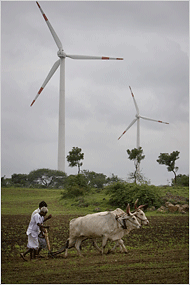 If you live in Washington, D.C., keep your eyes open this April. PepsiCo, the makers of Pepsi, Mountain Dew, and Aquafina, have begun field-testing 30 green vending machines. The machines feature a redesigned Pepsi logo and are prominently marked as green technology.
If you live in Washington, D.C., keep your eyes open this April. PepsiCo, the makers of Pepsi, Mountain Dew, and Aquafina, have begun field-testing 30 green vending machines. The machines feature a redesigned Pepsi logo and are prominently marked as green technology.
Apparently, the cola wars spilled over into the green tech sector a few years ago. Coca Cola has placed vending machines that use hydrofluorocarbon (HFC) alternatives at the Olympic Games since 2004 as well as at several other international events. Not to be outdone, along with the machines Pepsi is testing in the nation’s capital, they are testing a few thousand other machines around the world that use other green refrigerant alternatives to HFCs. Moreover, the older models these green machines are set to replace are themselves improvements over models from 2003. Both companies have also joined with Greenpeace and several other corporations to form the Refrigerants, Naturally! coalition, a group determined to reduce the environmental impact of HFC refrigerants.
The new Pepsi vending machines in D.C. have dispensed with HFCs in favor of carbon dioxide as a coolant, emitting at least 12% less greenhouse gas than earlier models. They also consume 15% less energy — 5.08 kilowatt-hours (kWh) as opposed to 6 kWh. (And these current machines already consume 44% less energy than those from six years ago.) The test machines in other parts of the world are using other refrigerant alternatives, including isobutane and propane.
While these machines cost more to manufacture, they cost less to operate due to the savings on electric bills. But PepsiCo is currently more concerned with promoting an environmentally friendly image, especially given criticisms over the industry’s conspicuous consumption of both plastic and water. In fact, they have pledged to reduce both water and electricity consumption by 20% and fuel consumption by 25% by 2015.
Robert Lewis, PepsiCo’s vice president of packaging and equipment development, said that the company has high hopes for their test, stating, “We’re constantly looking for ways to make our business more efficient and environmentally sustainable. This field-test will help us evaluate the performance and reliability of these new machines in a real-world environment.”
Photo Credit: Gaetan Lee at flickr


